- Home
- William Shakespeare
The Comedy of Errors Page 12
The Comedy of Errors Read online
Page 12
For her 2005 production, Nancy Meckler found "an uncanny set of dead ringers."62 A pair of statuesque black actors, Joe Dixon and Christopher Colquhoun, played the Antipholus twins, and two fine clowns, Jonathan Slinger and Forbes Masson, played a pair of scrawny Dromios with gravity-defying ginger quiffs. Slinger played the more cheerful clown, rolling with the punches, while Masson was surlier. At the end, while their masters were joyfully reunited, they were more guarded, more concerned to preserve their own identities.
Doubling Up
When Desmond Barrit and Graham Turner each played a pair of twins in Ian Judge's 1990 production, the usual problem of making two actors convincingly identical was reversed--Graham Turner wore different colored waistcoats to differentiate the two Dromios-- and much of the audience's delight was generated by the doubling. Peter Holland, who was unhappy with the doubling, thought
The surprises were tricks of theatre--like adroit switches between Barrit and his double to allow an apparently impossible immediate re-entry on one side of the stage a fraction of a second after he seemed to have left on the other--but the audience's gasps of pleasure at such spectacularly successful trompe l'oeil devices could not feed back into the play's concerns.63
Holland was particularly concerned about the effect of the doubling on the play's ending. The moment when the two pairs of twins find themselves onstage together is the moment the audience has been wondering about--the moment when the illusion that there are four actors will be shattered. The moment was skillfully stage-managed by the use of body doubles, but Holland comments,
It was the emotional force of the ending that was especially harmed. For Shakespeare's ending teeters gloriously on the edge of sentimentality. As brother finds brother at last, there is an emotional release for characters and for audience. When it works--and it usually does--there is something tearful about the reunions, the reconstitution of the family. Even the inevitably funny rediscovery of the missing mother does not prevent our joy, prefiguring something of the force of the families re-formed at the end of the late plays. By doubling the Antipholuses, the force is diluted. The audience watched how the doppelganger still tried to keep his back to them, following the theatrical technique, the actor's skill, not the play's argument.64
Comic Moments
Every production has its great comic moments: there are the set pieces--the conjuring by Doctor Pinch; the geographical tour round the physical characteristics of Nell, the fat serving maid; the great chase through the streets--but there are also moments of new invention. In 1962, Diana Rigg, as Adriana, realizing that it may not have been her husband that she had lovingly entertained earlier, delivered the question, "Which of you two did dine with me today?" with impeccable comic intonation, and Irving Wardle wrote of Judi Dench in 1976,
We are unlikely ever to see a funnier Adriana ... a peremptory odalisque downing her terrified servants with flying trays and point-blank bursts from the soda siphon and relapsing into voluptuous submission with her supposed spouse.65
In 1990, the audience's awareness that one actor was playing both Dromios was neatly exploited when Doctor Pinch sawed Dromio in two. In 2005, Christopher Colquhoun, as Antipholus of Ephesus, locked out of his house by his wife, picked up his Dromio (Forbes Masson) and used him as a shock-headed, ginger battering ram to force the door. In 2000, Lynne Parker's production took two of the great comic set pieces to new heights. David Tennant and Ian Hughes had established a particularly well-imagined relationship between master and servant, with Hughes playing not a clown, as many Dromios have done, but a slightly fussy, mustached "gentleman's gentleman." When they came to the geographical description of fat Nell in Act 3 Scene 2, they performed it as a piece of vaudeville, a hilarious double act played directly to the audience featuring, among other things, a retractable tape measure and often reducing the actors themselves to helpless laughter. The cinematic influence on the production was anarchically exploited in a Keystone Kops chase round the theater, which has become legendary. Not only did it feature a camel and a nun, but increasing numbers of the cast of Henry IV Part II (playing at the Swan Theatre next door and conveniently breaking for the interval as the chase took off), filling the streets of Ephesus with English lords, knights in armor, Desmond Barrit as Sir John Falstaff, and even, on the last night, Will Houston as Prince Hal.
6. Lynne Parker's 2000 production took the comic set pieces to new heights. David Tennant and Ian Hughes had established a particularly well-imagined relationship between master and servant, with Hughes playing not a clown but a slightly fussy, mustached gentleman's gentleman.
THE DIRECTOR'S CUT: INTERVIEWS WITH PAUL HUNTER, NANCY MECKLER, AND TIM SUPPLE
Paul Hunter studied drama at Middlesex College, where he and Hayley Carmichael decided to set up their own theater company, an ambition finally realized in 1993 with Told by an Idiot when they took their first production, On the Verge of Exploding, to the Edinburgh Fringe Festival. They have since built up the company's reputation and stature by "celebrating and revelling in a style of theatre that is bigger than life." Paul is a winner of the Jerwood Young Vic Award for Directing and his many directing credits include Beauty and the Beast (Warwick Arts Centre, Lyric Hammersmith), Casanova (Lyric Hammersmith), A Little Fantasy (Soho Theatre), Shoot Me in the Heart (the Gate), and I Weep at My Piano (BAC). He was associate director of Bolton Octagon between 2005 and 2008. Productions there included The Beauty Queen of Leenane (winner of Best Production, Manchester Evening News Awards). Recent directing credits include Signour Carras Rifles (Young Vic), The Opium Eaters (Brouhaha), The Underpants (Hope Street, Liverpool), Light Is Light (Brouhaha), and the Young People's Shakespeare The Comedy of Errors (2009) for the RSC, discussed here.
Nancy Meckler was brought up on Long Island, New York, and studied at Antioch College before completing a master's degree at New York University and going on to train as an actress at LAMDA. Resident in the UK since 1968, her move into directing proved artistically rewarding and successful with a much-admired production of Antigone at the Edinburgh Fringe Festival that went on to open the Berlin Festival. She has worked as associate director of the Hampstead Theatre and the Leicester Haymarket and was a founder member of the Freehold Theatre before joining the touring company Shared Experience, as joint artistic director. Nancy co-adapted and directed Mill on the Floss, and her award-winning productions have included Mother Courage and Her Children, True West, War and Peace, Heartbreak House, The Bacchae, and Anna Karenina. She directed Who's Afraid of Virginia Woolf? for the Royal National Theatre and Romeo and Juliet (2006) and The Comedy of Errors (2005) for the RSC, as well as the films Sister My Sister and Indian Summer.
Tim Supple, born in 1963, studied at Cambridge University. He worked as an assistant director at the York Theatre Royal, going on to direct at the Crucible Theatre in Sheffield, the Leicester Haymarket, and the Chichester Festival Theatre. As director of the Young Vic, he pioneered a style of theatrical narrative, often in the form of dramatizations of classic stories (such as Kipling's Jungle Book and a selection of tales from Ovid's Metamorphoses in the versions of Ted Hughes) that was simple and direct but also full of improvisation and innovative stage effect. At the Royal National Theatre he co-adapted and directed Salman Rushdie's Haroun and the Sea of Stories, Dario Fo's Accidental Death of an Anarchist, and The Epic of Gilgamesh. He has also successfully directed Hansel and Gretel and Mozart's Magic Flute for Opera North and John Browne's Babette's Feast for the Royal Opera House, Covent Garden. Supple's exciting, innovative, multilingual production of A Midsummer Night's Dream proved one of the highlights of the RSC Complete Works Festival (2006-07). He has staged plays for the RSC as diverse as Salman Rushdie's Midnight's Children, Frank Wedekind's Spring Awakening (translated by Ted Hughes), Love in a Wood, A Servant to Two Masters, and a small-scale touring production of The Comedy of Errors in 1996-97, which he discusses here.
What setting did you and your designer choose for the play?
TS: We set the pl
ay in a small square in front of a large and elegant building with a heavy wooden door. This location was important because it made the action specific rather than abstract and established a realism against which the magical strangeness of the play could be felt. The identity of the building and door shifted with the play: from the duke's center of power to the home of Antipholus and Adriana to the abbey at the end of the play, into which the whole family enter with their wives and Dromios. Sloping streets led to and from the square.
The architecture was reminiscent of a small, ancient Mediterranean city and the clothes the characters wore were chic and modern. The suggestion was an Italianate city such as Siena, in keeping with the names and the mercantile ethos of Ephesus. The music, however, was from the other side of the Mediterranean--Arabic, Turkish, and Greek--in keeping with the basic idea of Ephesus.
The combined texture of the setting was in the end lyrical and mystical; in appearance familiar and concrete but behind that infused with the miraculous strangeness of human fate.
NM: I always want the design of a production to express the meaning or theme of the play. And in this case we were thinking about questions of identity and the twins having been separated as babies. In the shipwreck where their family was torn apart, their parents had tied them to a mast and Katrina Lindsay, our designer, came up with the idea of expressing the moment when the mast split and the brothers drifted apart, each with his respective servant Dromio.
Finally, our set was impressionistic, suggesting the deck of a ship with two huge masts reaching to the sky. The clouds in the sky were torn white sheeting as if the ship's sails had been wrenched off and then become the clouds. It also felt like we were performing in a town square very near the harbor.
PH: We were influenced by the films of a Yugoslavian film director called Emir Kusturica, and although we weren't specifically trying to recreate his world, there was something about the energy of his films like Black Cat White Cat and Underground, which all take place in Yugoslavia from the Second World War through to the present day, which we wanted to use. It wasn't a specific thing, it was more about the energy of those films, and also the fact a lot of his work is set by the sea, the water is very present, as are people arriving and traveling. So that was our influence.
The Comedy of Errors is unusual among Shakespeare's plays in obeying the classical unities of time and place (one day, one location): what sort of constraints and opportunities followed from this?
TS: For me the most powerful clue offered by that fact is toward the realism at the heart of the play. Like all good farce it relies on a basis of ordinary truth as found in common experience: home, marriage, trade, family, servitude, etc. And like all good mystical work it is similarly grounded in life as lived by the people. Shakespeare's mysticism had a long way to go, through the later comedies and the tragedies until it arrived at The Tempest. But he always balanced good, grounded plotting with playful, strange, and magical suggestion. In The Comedy of Errors both are there but the former far outweighs the latter.
It had always struck me as strange that the contemporary tradition of producing this play has become a vivid abstraction--as if it has to be somehow unreal to make sense. I think that the unity of time and place is just one powerful suggestion amongst many that the intention of the play is rooted in a simple, truthful, and realistic portrayal of life, like a good Roman comedy or Italian farce. The content of the play--the thought, speech, and action--is another. It is rarely abstract, philosophical. Rather it is usually about the basic issues: food, money, sex, family. It's the tragedy of loss experienced by Egeon and the search by Antipholus of Syracuse for his other half that shifts the play both into extreme farce and onto a spiritual plane. This happens gradually and sweeps all up into its wonder. But the starting point, and the frame throughout, is one day in one place amongst lives lived as most of us live. It is no coincidence that it is one of Shakespeare's most bourgeois plays. As his work became more abstract, more radical, more poetic and mystical, he played with a greater variety of form and a wider canvas of characters.
NM: A great deal of this play is set outdoors and our set felt very exterior. But then we created interiors with simple elements being wheeled on. Adriana's house was shown by having the table and chairs and a waiting dinner. The courtroom scene at the beginning was performed as if it were an outdoor trial and the duke's throne of office was in fact a barber's chair. This had Mafia overtones and it also meant his henchmen started off as his barbers. In between each scene we had a street singer which helped denote passage of time while we changed the elements of set for the next scene. During these scene changes we also saw the street life of the town, which included old Egeon wandering with his jailer, making unsuccessful attempts to raise the ransom for his life before the sunset deadline. We also had street musicians onstage for the entire show as if they were in the town square.
7. Nancy Meckler's 2005 production in commedia dell'arte mode with a huge amount of slapstick: (left to right) Jonathan Slinger, Dromio of Syracuse; Bettrys Jones, Luce; Christopher Robert, First Merchant; Kevin Trainor, Messenger; Suzanne Burden, Adriana; and Forbes Masson, Dromio of Ephesus.
PH: I found that idea very liberating. Because the play fundamentally works in the spirit of confusion and mistakes, that for me became enhanced and more interesting because of the fact that it was played out within one day and one place. What Shakespeare does brilliantly is intensify what the play is working on, like the idea of these confusions escalating, which wouldn't have such power if they were more spread out, they would become more diluted. So I didn't really have any problems with that, I actually found that really satisfying to work from.
Twins are visually indistinguishable--that's the basis of the comedy--but did you and your actors discover big differences of character between the Antipholus boys?
TS: Yes, many. Not as many as there would have been if the later, more sophisticated Shakespeare had written the play but the later Shakespeare had moved on and this play has its own exquisite poise that clearly delights audiences throughout time and cultures. The men are similar enough to keep the situation simple and clear, but there are enough differences to provide the basis of very different characters onstage. Perhaps these differences are as much differences of circumstances as nature but that is one of the fundamental questions of the play: What makes us? Nature or nurture? Our genes or our experience?
Antipholus of Ephesus is successful, busy, out all the time, flirting with courtesans, neglecting his home and wife. He is materially minded, scornful and cruel to his Dromio. He is a tough-minded man living in a tough trading environment. His brother is more reflective, more ready to talk to his Dromio as a companion, and he is unmarried and unattached so he's searching for companionship. He has left his home to find the answers to his existence while Antipholus of Ephesus is wrapped up in the material and physical issues of domestic, rooted life.
Of course, they are two sides of one character common throughout humanity; one travels and the other builds the nest. When situation takes over they both act alike: they both beat their Dromios when they cannot find the words to deal with their exasperation.
NM: I was deeply impressed by how different the twins are and we discovered in rehearsal that this might come directly from their childhood experiences. The local twin, Antipholus of Ephesus, knows little of his past: only that he was found by Corinthian sailors and eventually distinguished himself in the army, which led to him being given a very wealthy prestigious wife as a prize for his gallantry.
He and his servant do not know that they have twins. This Antipholus is an important local figure and he is beginning to behave badly, cheating on his wife, gambling, physically maltreating his servant. Given his past and lack of knowledge about it, we postulated that he was deeply insecure about who he really was and needed to discover his roots. This accounted for his arrogant, brash, selfish behavior.
By contrast, Antipholus of Syracuse and his servant do know about their pa
st. This Antipholus knows his parents and knows he is a twin. He feels he will be incomplete until he finds his other half. He has even taken on his brother's name and has spent years searching for him, so passionate is his quest. His nature is gentle, yearning, lonely, melancholic. He is good to his servant and treats him as a companion: thus two very different twins.
PH: Yes, I suppose we did. My starting point and approach was very much physical, as it is with all the work I do, so even though we were
8. From 2009, Paul Hunter's production with Antipholus of Ephesus (James Tucker) as "a bit of a showman."
looking at this wonderful play, the starting point was much more about how the twins are physically, and trying to learn about their characters from what they do. So those differences emerged through playing and through action, rather than through discussion. There was a moment when we wanted Antipholus of Ephesus, the one who is ostensibly "at home," to appear earlier than he actually does in Shakespeare's play, so that the audience would visually get an image of the two twins right at the top of the play. They don't see each other, but we see them, and as an audience you go, "Ah yes, there they are," rather than waiting for quite a while for the entrance of Antipholus of Ephesus. By doing that it also showed quite a difference in their personalities, because Antipholus of Ephesus in some ways is revealed to be a bit of a showman (although maybe not when his wife's around!). In our production you saw him doing a stupid routine playing spoons, and the band onstage loved him, but the other Antipholus [of Syracuse] who arrived couldn't play them at all--he's less of a showman in that sense. So rather than it being discussed, it tended to emerge through improvising and playing with the situations.

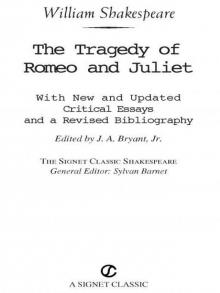 Romeo and Juliet
Romeo and Juliet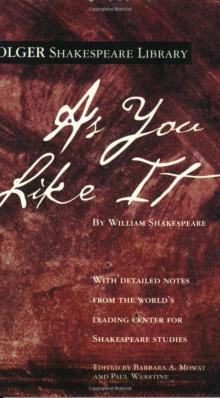 As You Like It (Folger Shakespeare Library)
As You Like It (Folger Shakespeare Library)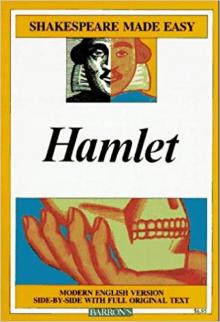 Hamlet
Hamlet Richard II (Folger Shakespeare Library)
Richard II (Folger Shakespeare Library) Macbeth
Macbeth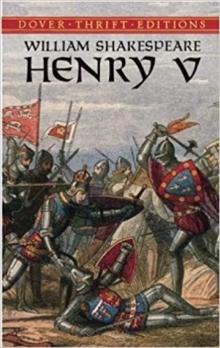 Henry V
Henry V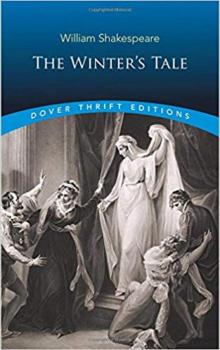 The Winter's Tale
The Winter's Tale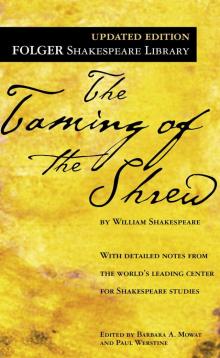 The Taming of the Shrew
The Taming of the Shrew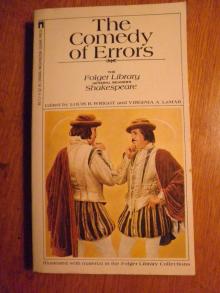 The Comedy of Errors
The Comedy of Errors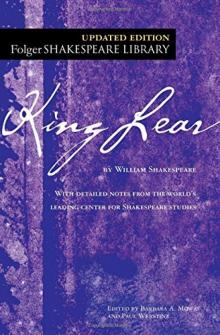 King Lear (Folger Shakespeare Library)
King Lear (Folger Shakespeare Library)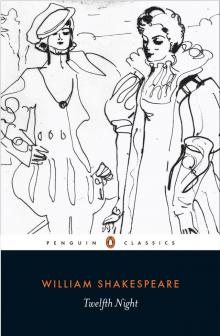 Twelfth Night
Twelfth Night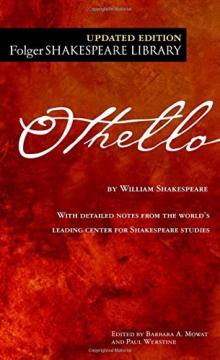 Othello
Othello The Two Gentlemen of Verona
The Two Gentlemen of Verona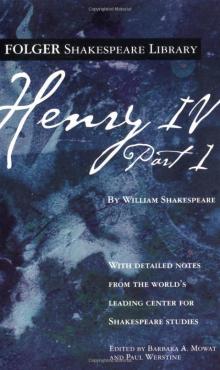 Henry IV, Part 1 (Folger Shakespeare Library)
Henry IV, Part 1 (Folger Shakespeare Library)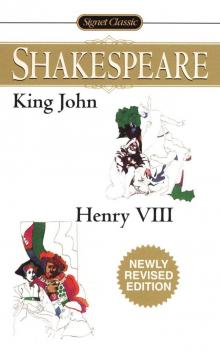 King John/Henry VIII (Signet Classics)
King John/Henry VIII (Signet Classics)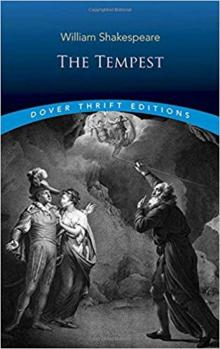 The Tempest
The Tempest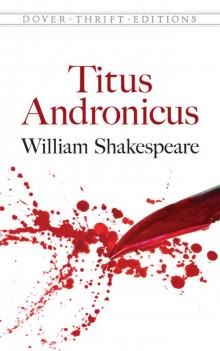 Titus Andronicus (Dover Publications)
Titus Andronicus (Dover Publications)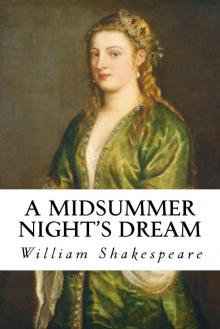 A Midsummer Night's Dream
A Midsummer Night's Dream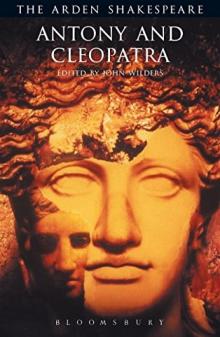 Antony and Cleopatra (Arden Shakespeare: Third Series)
Antony and Cleopatra (Arden Shakespeare: Third Series)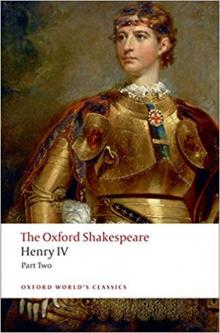 The Oxford Shakespeare: Henry IV, Part 2 (Oxford World's Classics)
The Oxford Shakespeare: Henry IV, Part 2 (Oxford World's Classics)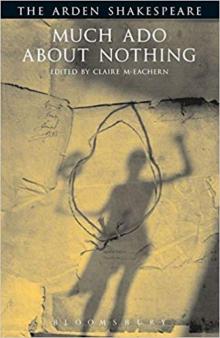 Much Ado About Nothing (Arden Shakespeare: Third Series)
Much Ado About Nothing (Arden Shakespeare: Third Series) All's Well That Ends Well
All's Well That Ends Well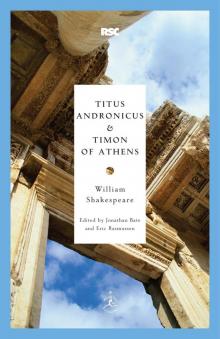 Titus Andronicus & Timon of Athens
Titus Andronicus & Timon of Athens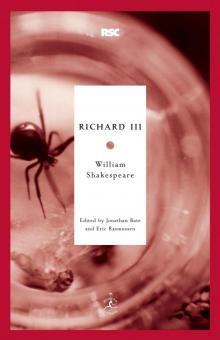 Richard III (Modern Library Classics)
Richard III (Modern Library Classics) Coriolanus
Coriolanus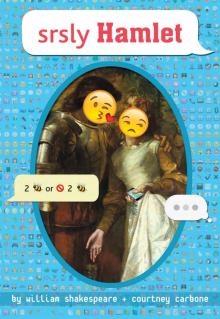 srsly Hamlet (OMG Shakespeare)
srsly Hamlet (OMG Shakespeare)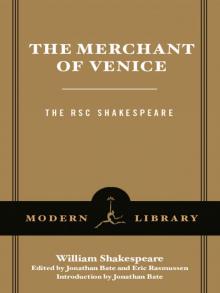 The Merchant of Venice
The Merchant of Venice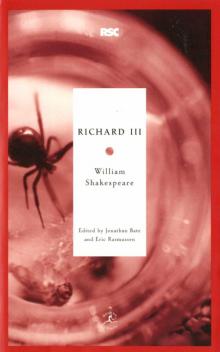 Richard III
Richard III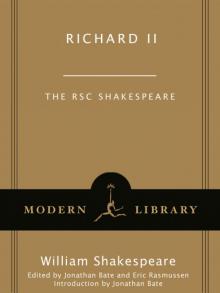 Richard II
Richard II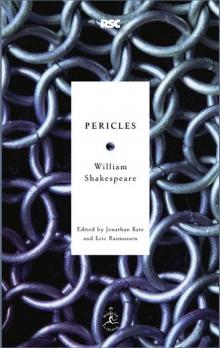 Pericles
Pericles As You Like It
As You Like It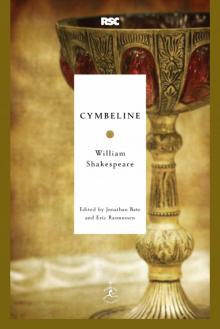 Cymbeline
Cymbeline Alls Wel that ends Well
Alls Wel that ends Well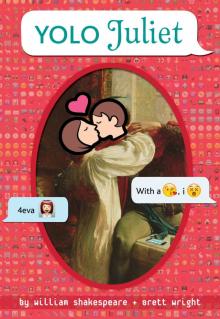 YOLO Juliet
YOLO Juliet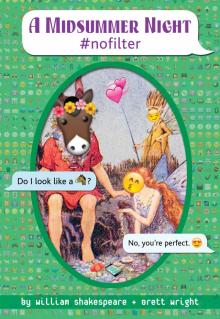 A Midsummer Night #nofilter
A Midsummer Night #nofilter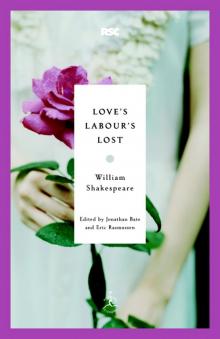 Love's Labour's Lost
Love's Labour's Lost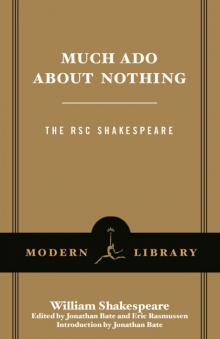 Much Ado About Nothing
Much Ado About Nothing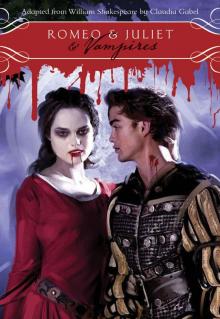 Romeo & Juliet & Vampires
Romeo & Juliet & Vampires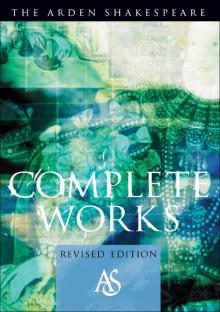 The Arden Shakespeare Complete Works
The Arden Shakespeare Complete Works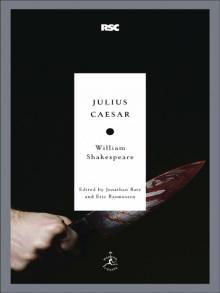 Julius Caesar
Julius Caesar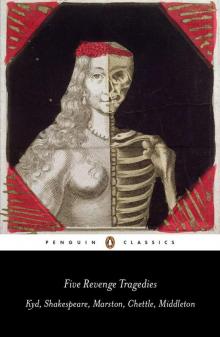 Five Revenge Tragedies: The Spanish Tragedy, Hamlet, Antonio's Revenge, The Tragedy of Hoffman, The Revenger's Tragedy (Penguin Classics)
Five Revenge Tragedies: The Spanish Tragedy, Hamlet, Antonio's Revenge, The Tragedy of Hoffman, The Revenger's Tragedy (Penguin Classics)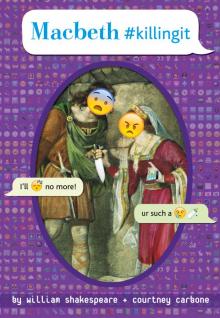 Macbeth #killingit
Macbeth #killingit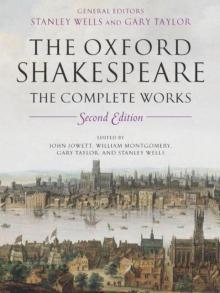 The Oxford Shakespeare: The Complete Works
The Oxford Shakespeare: The Complete Works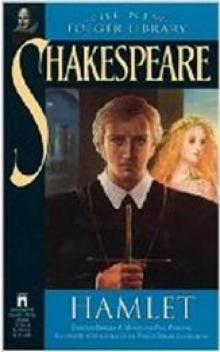 Hamlet, Prince of Denmark (Collins edition)
Hamlet, Prince of Denmark (Collins edition)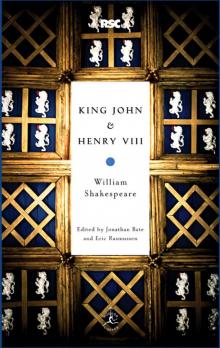 King John & Henry VIII
King John & Henry VIII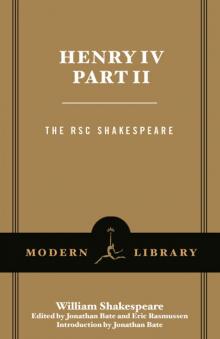 Henry IV, Part 2
Henry IV, Part 2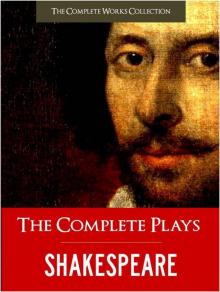 Complete Plays, The
Complete Plays, The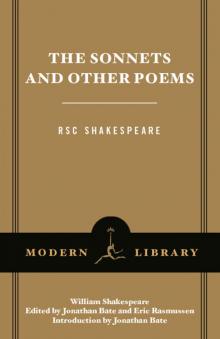 The Sonnets and Other Poems
The Sonnets and Other Poems Antony and Cleopatra
Antony and Cleopatra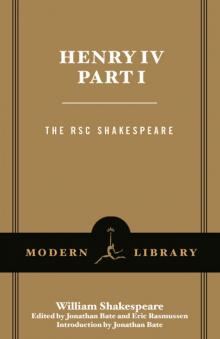 Henry IV, Part 1
Henry IV, Part 1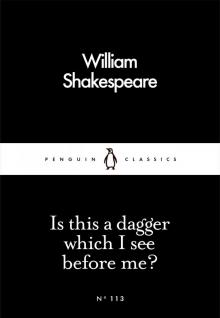 Is This a Dagger Which I See Before Me?
Is This a Dagger Which I See Before Me? The Complete Works of William Shakespeare In Plain and Simple English (Translated)
The Complete Works of William Shakespeare In Plain and Simple English (Translated)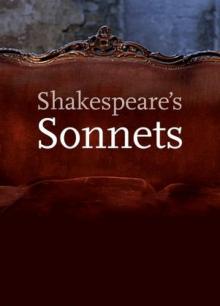 The Sonnets
The Sonnets